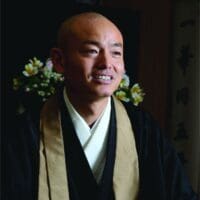This talk explores a well-known writing in the area of meditation in the Japanese Zen tradition entitled Yasenkanna (夜船閑話, or Idle Talk on a Night Boat), one of Hakuin’s autobiographies, written in 1757 by the Zen Master Hakuin Ekaku (1686–1769), a seminal figure who occupies a prominent place in the history of Japanese religion today. We will exam- ine how Hakuin specifically focused on his Zenbyō, or “Zen sickness,” which developed in his youth when he devoted himself to a hard practice of Zen. We will look at how he considers the dramatic experience of his struggle against the body/mind problem. We will also discuss how he considers the ways in which meditation techniques that engage body-fo- cused attention, which he learned from a cave-dwelling hermit, brought him to a complete recovery over time.
The talk will focus on the introspective meditation techniques he learned from the hermit (内観の法, or naikan no hō, and 軟酥の法, or nanso no hō, the tanden or “cinnabar field” located below the navel. Hakuin also discussed the range of roles of meditation as a tool for religious exercise toward enlightenment, but also as a means of health or therapeutic hygiene. Perhaps most importantly, I illustrate that the principal question asked by Hakuin in this writing is consistently relevant to some of the crises of our own times, in the larger context of our everyday lives.

Masaki Matsubara, PhD
Cornell University
Masaki Matsubara, Ph.D. Masaki Matsubara is a scholar of Japanese religions at the East Asia Program at Cornell University and is also a Japanese Rinzai Zen priest. Following his Zen … MORE

